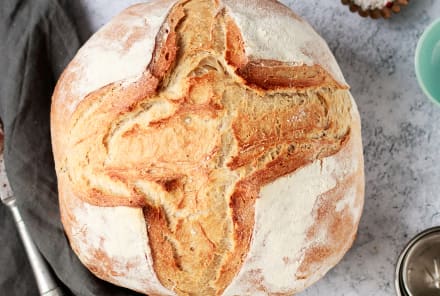Advertisement

Most of us want to feel like we're leading meaningful lives. But what exactly creates a life that's brimming with "meaning"? We might think of social or environmental activism, close relationships with friends and family, connection to the divine, or grand adventures that require rocketing outside of our comfort zone. These can all be wonderfully positive and achievable goals to pursue, but new research suggests there might be an even simpler, inward-focused way to unlock that sense of larger importance that we humans all crave: routines.
In a paper published last week in the Personality and Social Psychology Bulletin, researchers conducted two studies that found people who regularly engage in routines experience a higher sense of meaning in their lives than those who don't.
The researchers defined finding "meaning in life" as feeling a combination of significance (that you matter to something larger than yourself), purpose (that there's a reason for what you're doing), and coherence (that life "makes sense"). In the first study, they measured how significant, purposeful, and coherent people felt their lives were, and then asked participants to rate how much they agreed with statements like, "I find that a well-ordered mode of life with regular hours is the one for me," and, "I do pretty much the same things every day." The results? People with a penchant for routines saw their lives as more meaningful than those who prefer less structure.
For the second part of the study, the authors sent participants surveys via their smartphones six times each day for a week. With every survey, respondents answered questions about what they were doing at the moment, whether the activity was part of their regular routine, and how much "meaning" they were feeling right at that moment. Their answers still showed that engaging in routine activities boosted the participants' sense of meaning, even on the daily, moment-to-moment level.
We love to connect the idea of extraordinary experiences with the concept of meaningfulness, but these findings suggest more mundane daily habits like studying, walking, or eating a delicious meal also contribute to that same satisfying feeling of larger-than.
"Too many of us have put meaning on a pedestal—making it almost inaccessible. We see meaning as some esoteric pursuit—something you have to travel to the temples of India to find," Emily Esfahani Smith, author of The Power of Meaning: Crafting a Life That Matters, told mbg. "But meaning is much simpler than that… All of us have unique sources of meaning that reflect our own experiences, values, and personalities."
Want more meaning in your life? It may be as simple as adopting a regular morning ritual that also has the added plus of starting your day off on the right foot. And importantly, a routine doesn't have to be complicated to be beneficial—it can be as simple as taking a few mindful moments when you wake up.
Watch Next
Enjoy some of our favorite clips from classes
Enjoy some of our favorite clips from classes
What Is Meditation?
Mindfulness/Spirituality | Light Watkins
Box Breathing
Mindfulness/Spirituality | Gwen Dittmar
What Breathwork Can Address
Mindfulness/Spirituality | Gwen Dittmar
The 8 Limbs of Yoga - What is Asana?
Yoga | Caley Alyssa
Two Standing Postures to Open Up Tight Hips
Yoga | Caley Alyssa
How Plants Can Optimize Athletic Performance
Nutrition | Rich Roll
What to Eat Before a Workout
Nutrition | Rich Roll
How Ayurveda Helps Us Navigate Modern Life
Nutrition | Sahara Rose
Messages About Love & Relationships
Love & Relationships | Esther Perel
Love Languages
Love & Relationships | Esther Perel














